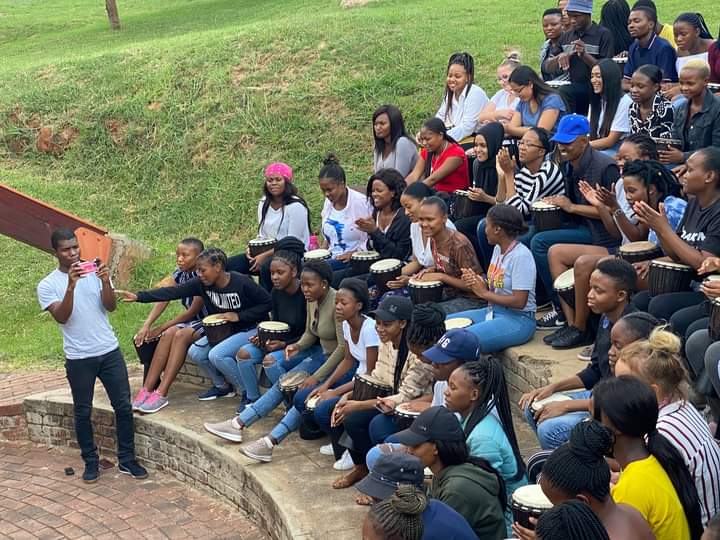Today we’re speaking to a dynamic gentleman who has spent many years advocating for children and teachers in the rural villages. In this red hot conversation, Linford talks about how much harm people cause, while trying to do good in the rural communities.
First let’s get to know Linford…
Linford Molaodi is a rural boy, who grew up under poverty, the first born and brother to four girls. I am from Limpopo Village called Ga Sekhukhune.
Was Teaching always something you wanted to do?
Teaching was not my first choice; it is something I did out of necessity because there was funding available. Poverty taught me to be humble and value other people because you never know what they had to overcome to be where they are today.
When I saw people’s lives changing because of my work, I then became very passionate about teaching.
Introducing technology to the rural schools was the most important thing for me. I found myself playing an important role in my Education District, I played a role as a chairperson of the Science Committee in one of the circuits. From then I was handed a responsibility of training teachers on shoe-string teaching and technology integration which was something I enjoyed doing.
You founded a Project how is it going?

TearStel was greatly affected by Covid-19 which meant that we had to change our approach. We used to conduct annual events for the learners in the Rural schools. Due to covid-19, we had to re-align the organization in order to respond better to the current and future circumstance which restrict physical contacts. Organisations should constantly change. Covid-19 is a good lesson for us.
I’ll be stepping down as the executive director to allow the organization to have a new breed of leaders who happen to be the hardest working breed with more energy than myself even. I’ll be helping in the background, playing a role to strengthen relationships with partners, the potential funders and also enhance local and international relationships.
As a leader, one should know when their time is up. One should know when it is time to allow new leadership to take the organization forward. The organization has grown. Previous beneficiaries are now graduates and have done well for themselves. Annually, they voluntarily come to make contributions as guests. Some have even joined the organization formally.. My new roles will include facilitation those relations as well. We are also considering alumni projects. As a founder of the project it is important that I allow the current leadership to run with it without any limitations. My stepping down is actually an expansion of the project.
Now Mr. Lin, what is your take on the continued calls for free education?
The free education call by students has two lenses to it:
- Political influence: there may be students who are using this to advance their political ambitions, this can positively add a louder voice to the legitimate cry for free education, but the approach may not be ideal. We cannot build a nation by destroying services and structure from which we are benefiting and have benefited.
- The educational lens is the most appreciated. There are many learners who have interest in pursuing studies but due to lack of funds they are unable to fulfil their dreams. There exists bursaries, but these are filtering. There have to be specific requirements met. For an example: a student may have a brother or a family member who works, the system immediately rejects these students and they don’t qualify for some funding. But they do not consider the fact that the family member who works may not be earning enough to accommodate the entire family including the student siblings.
In addition, the organizations normally choose the cream of the crop (students who are naturally smart) to fund, however the students that do not get funded may be a missed opportunity, some of the “cream of the crop” disappear after matric – having high marks sometimes does not mean someone learnt the required competencies. Generally, if one can gather question papers for the past ten years and practice daily, they can get total in the exam because questions are constantly recycled. The one who can cram and reproduce may get higher marks and considered to have understood content- but this is not the case. We are missing average students who might benefit from funding.
On the quality of our education….

Our education still needs a lot to work on, but I believe we are gradually getting there. Currently, there is no much focus on competencies and strategies that help learners develop as humans. We need to help learners thrive in different situations, and also be able to get jobs to better themselves.
We keep recycling same information and strategies even though the world is changing.
And so we are prioritizing pass-rates instead of producing students with understanding and knowledge. In fact, some of the so called “cream of the crop” struggle at the University and the average students excel.
How do we serve children in the Rural Areas better?
Children in the rural areas are also humans, they deserve the same interventions given to schools in the urban areas. We need organizations that will not go there for popularity and social media selfie purposes. We need organization that are honest and genuine.
Those have commitment towards creating sustainable interventions, instead of once-off interventions. I sometimes joke and call them Beauty Contest interventions. If you are keen to provide interventions in our rural communities, you need to be humbled. Go to the community, consult first with the leaders or other organizations who are already active in that community.

People normally say learners in rural areas are disadvantaged and therefore “cannot do this and that…”, I beg to differ. We have a tendency to undermine and underestimate the intelligence of learners in the rural areas. I always say YOU CANNOT INTEND TO UPGRADE A COMMUNITY WITH A DOWNGRADING MINDSET. People in these communities have always found ways to live and survive without you. There’s a life already taking place there. It may not be to your approval but who are you to want to define how should people live or conduct their lives?
Before there was electricity, people in rural villages lived, they made fire and they were warm. During Loadshedding, life in the city stops, people in the rural villages make fire , cook and bath, life carries on, that is intelligence. It is strength not a weakness.
People always say children in the rural villages “cannot”, again I ask, who are you to define what these children can and cannot do? We are all products of the Creator, God and have been gifted differently. Give children resources and watch them thrive. While you may want to intervene and improve lives of children in the rural villages, you may find that you are actually doing more harm with your mindset and the way you use your words! If you go to the children in the these places with the mindset that defines them as disadvantaged, then they will echoe your words and thoughts of “disadvantaged”.
People always say children in the rural villages “cannot”, again I ask, who are you to define what these children can and cannot do? Give children resources and watch them thrive. While you may want to intervene and improve lives of children in the rural villages, you may find that you are doing more harm! If you go to the children in the these places with the mindset that defines them as disadvantaged, then they will echoe your words and thoughts of “disadvantaged”.

We need to fix our mindset before going into the communities because you cannot bring sustained interventions while you have a degrading mindset towards these communities! If your mindest and your language do not change, then you are just another advantaged person exploiting the “disadvantaged” for your own ego. But with the right mindset and attitude which do not look down upon these communities, then you can make an everlasting impact.
Children in the rural villages may not know what is 4IR including their teachers, then you find these big tech companies going to make presentations using the language that is not understandable to the general public.
In one of the workshops meant for teachers, some academics were explaining 4IR using the terms “algorithms, computational thinking, etc” which were totally foreign to these people. One teacher who was next to me whispered, “Linford, these are your people, and you probably understand their language as you are in academia. Will you please re-explain the conversation after this presentation. Many of us are not hearing anything here.” You go there with all these titles and accolades, kids and teachers will immediately disconnect because you are not relatable, even your dress code shows a big gap between yourself and the people you’re bringing intervention to.
We need to go to rural villages and be in the people’s level, connect with the local leaders and build relationships before announcing your royal arrival. Children do not learn from people they do not like, in order for them to like you there needs to be a relationship and the trust that is built through local organizations and leaders.
When there’s trust, people have access to you, then your interventions will yield everlasting fruits.
Our editor has written an ultimate guide to survive unemployment!
